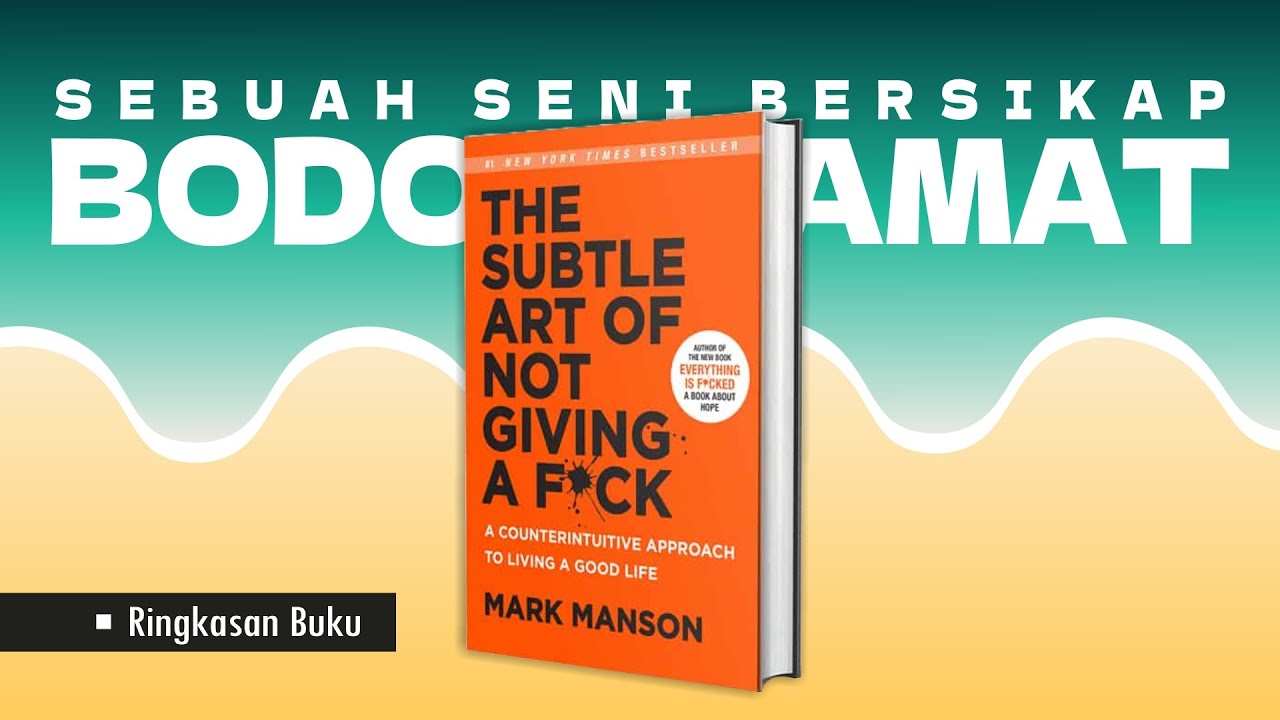Kunci dari Kebahagiaan = Bersikap Bodo Amat?! Maudy Ayunda's Booklist
Summary
TLDRIn this booklist episode, Maudy Ayunda explores 'The Subtle Art of Not Giving a F*ck' by Mark Manson. The book challenges readers to confront life's endless problems head-on and reframe them as exciting challenges. Manson advises focusing energy on what truly matters, advocating for a selective approach to life's concerns. He also encourages finding joy in the ordinary, reminding us that happiness and success can be found in everyday moments, not just grand achievements. The summary invites viewers to reflect on their priorities and the true sources of their happiness.
Takeaways
- 📚 The book 'The Subtle Art of Not Giving a F*ck' by Mark Manson is a self-help guide that offers pragmatic and blunt life advice.
- 🔍 Life is presented as an endless series of problems, and the author suggests facing them one at a time to avoid creating new issues.
- 💡 Manson encourages changing our mindset from avoiding problems to seeking out those that excite and challenge us.
- 🚫 The book advises against saying 'f*ck it' to everything, but rather to focus on what truly matters and let go of the less important things.
- 🌱 As we mature, we should become more selective about the things we care about, as not everything we fixate on in our 20s has a lasting impact.
- 💖 Happiness and success can be found in ordinary moments, not just in grand achievements, and we should define our own terms of what they mean.
- 📈 Social media can create a culture of competition and comparison, but true happiness comes from within and not from external validation.
- 🤔 The book prompts readers to self-reflect on what they consider important and to align it with their life values.
- ⚠️ The phrase 'Fake it till you make it' can be dangerous as it may lead to toxic positivity; it's crucial to acknowledge life's unpredictability.
- 🎁 The speaker invites listeners to recommend books for review and offers a special gift to the best comment, encouraging engagement with the audience.
Q & A
Who is the author of the book 'The Subtle Art of Not Giving a F*ck'?
-The author of the book 'The Subtle Art of Not Giving a F*ck' is Mark Manson.
What genre is Mark Manson known for?
-Mark Manson is known for his work in the self-help genre.
What is the main theme of the book 'The Subtle Art of Not Giving a F*ck'?
-The main theme of the book is learning to prioritize what truly matters in life and not getting bogged down by unimportant things.
What does the author suggest as the first way to face life's problems?
-The first way to face life's problems suggested by the author is to confront them one at a time, as avoidance leads to a fear-cycle and creates new problems.
How does the author propose changing our mindset towards problems?
-The author proposes changing our mindset from 'How to get rid of these problems?' to 'What are the problems that make me excited?' and 'What are the problems that are worth fighting for?'
What is the second insight shared in the book about saving energy?
-The second insight is to save energy for things that actually matter, focusing on what truly impacts our lives rather than getting fixated on trivial matters.
What does the author mean by 'maturity' in the context of the book?
-In the context of the book, 'maturity' is achieved when we learn to care only about things that really matter and let go of the unimportant.
What is the third insight about taking pleasure in the ordinary?
-The third insight is that happiness and success can be found in ordinary, everyday moments, and not just in big, celebratory achievements.
How does social media influence our perception of happiness according to the book?
-Social media can create a culture of competition and comparison, making us overlook the happiness found in small, everyday moments.
What is the author's reminder about the value of ordinary things?
-The author reminds us that just because something looks basic or simple doesn't mean it's not valuable; sometimes, the ordinary is what truly matters.
What is the narrator's personal realization after reading the book?
-The narrator realizes that the quote 'Fake it till you make it' can be dangerous and that it's important to acknowledge that life may not always go as planned.
Outlines

此内容仅限付费用户访问。 请升级后访问。
立即升级Mindmap

此内容仅限付费用户访问。 请升级后访问。
立即升级Keywords

此内容仅限付费用户访问。 请升级后访问。
立即升级Highlights

此内容仅限付费用户访问。 请升级后访问。
立即升级Transcripts

此内容仅限付费用户访问。 请升级后访问。
立即升级浏览更多相关视频

The Subtle Art of Not Giving a F*ck - Summarized by the Author

كيف يمكن أن يقودك الإهتمام بكل شيء.. إلى لا شيء ! فنّ اللامبالاة

Comment s'en Foutre ? (9 Leçons - L'Art Subtil de s'en Foutre)

Bersikap BODO AMAT ala Mark Manson | Ringkasan Buku Audiobook

Hidup tanpa media sosial = lebih bahagia?! Maudy Ayunda's Booklist

Rahasia orang sukses bangun jam 5 pagi?! Maudy Ayunda's Booklist
5.0 / 5 (0 votes)
